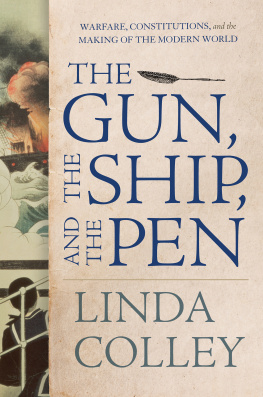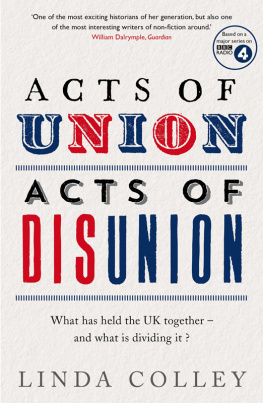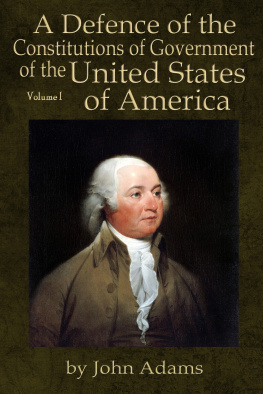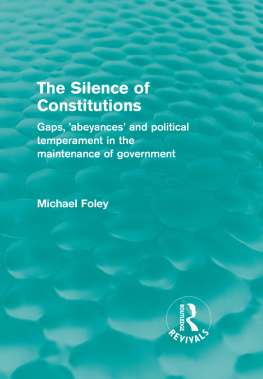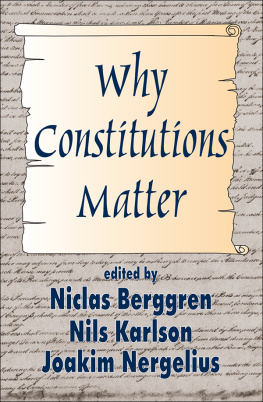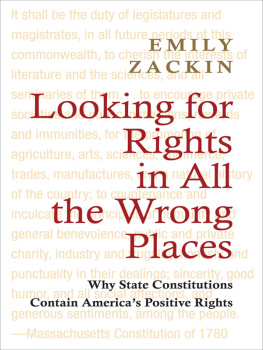Linda Colley - The Gun, the Ship, and the Pen: Warfare, Constitutions, and the Making of the Modern World
Here you can read online Linda Colley - The Gun, the Ship, and the Pen: Warfare, Constitutions, and the Making of the Modern World full text of the book (entire story) in english for free. Download pdf and epub, get meaning, cover and reviews about this ebook. City: New York, year: 2021, publisher: Liveright, genre: History. Description of the work, (preface) as well as reviews are available. Best literature library LitArk.com created for fans of good reading and offers a wide selection of genres:
Romance novel
Science fiction
Adventure
Detective
Science
History
Home and family
Prose
Art
Politics
Computer
Non-fiction
Religion
Business
Children
Humor
Choose a favorite category and find really read worthwhile books. Enjoy immersion in the world of imagination, feel the emotions of the characters or learn something new for yourself, make an fascinating discovery.
- Book:The Gun, the Ship, and the Pen: Warfare, Constitutions, and the Making of the Modern World
- Author:
- Publisher:Liveright
- Genre:
- Year:2021
- City:New York
- Rating:4 / 5
- Favourites:Add to favourites
- Your mark:
The Gun, the Ship, and the Pen: Warfare, Constitutions, and the Making of the Modern World: summary, description and annotation
We offer to read an annotation, description, summary or preface (depends on what the author of the book "The Gun, the Ship, and the Pen: Warfare, Constitutions, and the Making of the Modern World" wrote himself). If you haven't found the necessary information about the book — write in the comments, we will try to find it.
Vivid and magisterial, The Gun, the Ship, and the Pen reconfigures the rise of a modern world through the advent and spread of written constitutions.
A work of extraordinary range and striking originality, The Gun, the Ship, and the Pen traces the global history of written constitutions from the 1750s to the twentieth century, modifying accepted narratives and uncovering the close connections between the making of constitutions and the making of war. In the process, Linda Colley both reappraises famous constitutions and recovers those that have been marginalized but were central to the rise of a modern world.
She brings to the fore neglected sites, such as Corsica, with its pioneering constitution of 1755, and tiny Pitcairn Island in the Pacific, the first place on the globe permanently to enfranchise women. She highlights the role of unexpected players, such as Catherine the Great of Russia, who was experimenting with constitutional techniques with her enlightened Nakaz decades before the Founding Fathers framed the American constitution. Written constitutions are usually examined in relation to individual states, but Colley focuses on how they crossed boundaries, spreading into six continents by 1918 and aiding the rise of empires as well as nations. She also illumines their place not simply in law and politics but also in wider cultural histories, and their intimate connections with print, literary creativity, and the rise of the novel.
Colley shows howwhile advancing epic revolutions and enfranchising white malesconstitutions frequently served over the long nineteenth century to marginalize indigenous people, exclude women and people of color, and expropriate land. Simultaneously, though, she investigates how these devices were adapted by peoples and activists outside the West seeking to resist European and American power. She describes how Tunisia generated the first modern Islamic constitution in 1861, quickly suppressed, but an influence still on the Arab Spring; how Africanus Horton of Sierra Leoneinspired by the American Civil Wardevised plans for self-governing nations in West Africa; and how Japans Meiji constitution of 1889 came to compete with Western constitutionalism as a model for Indian, Chinese, and Ottoman nationalists and reformers.
Vividly written and handsomely illustrated, The Gun, the Ship, and the Pen is an absorbing work thatwith its pageant of formative wars, powerful leaders, visionary lawmakers and committed rebelsretells the story of constitutional government and the evolution of ideas of what it means to be modern.
80 black-and-white illustrationsLinda Colley: author's other books
Who wrote The Gun, the Ship, and the Pen: Warfare, Constitutions, and the Making of the Modern World? Find out the surname, the name of the author of the book and a list of all author's works by series.

